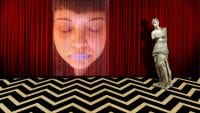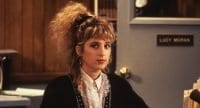I recently had the opportunity to chat with Karl and Jubel, the hosts of “Counter Esperanto: Tangents About Twin Peaks”. We had a really fun conversation about the origins of their show, “The Secret History of Twin Peaks”, the return of the series, David Lynch and a lot more. After you read this interview, be sure to check them out on both Facebook and Twitter and give their show a listen! I hope you enjoy the conversation.
Andrew: Thank you, gentlemen, for joining us here on 25 Years Later for this interview. For those that are unaware, could you give us a bit of background on your friendship and how you both got into Twin Peaks?
Jubel: I moved with my parents to the Colville/Kettle Falls area of Northeastern Washington, which happens to be the almost exact location of Twin Peaks in the show (where it’s set, not where it’s filmed of course). Karl was one of the first friends I made in High School and he’s my only friend from that era that I’m still in touch with. I was vaguely aware of the existence of Twin Peaks when it was on but basically didn’t watch it because my parents didn’t watch it (I was in my very early teens). I think they tried some random episode in the middle of the first season, felt lost, and didn’t revisit it until several years later when Karl and I included my parents in our first re-watch. They enjoyed it, once they had some idea of what was going on.
Karl: Our friendship started in the turmoil of standard-issue high-school horrors. It takes a few generations for the new kid smell to wash off in some small towns, and we were both the kind of people who read too much to be considered cool, as Colville lacked a Bookhouse Boys chapter. People on the fringes gravitate together, and that was what happened to us. Twin Peaks actually came into our lives slightly later. After High School, I moved in with Jubel and his parents because they were moving to Portland, Oregon, whereas my folks had to move to Fort Worth, Texas… and I don’t do so well in the heat. It was a Hollywood Video rental place that had the VHS tapes of the full series of Twin Peaks. We had already caught a few of Lynch’s other works (Dune, Blue Velvet) so we started with the European Pilot tape and were hooked from then on.
A: Jubel told me prior to this interview that you had ideas for other podcasts but The Secret History of Twin Peaks was what really set you guys in motion. What was it about that book in particular that inspired you to start your show?
J: A couple of things. One, I was impressed by all of the different elements that Mark Frost was bringing together. Like Karl, I enjoyed the epistolary nature of the book, but also saw that he was drawing on mythology and specifically Northwest Weirdness that Karl and I had been enjoying in the writings of Weird authors like Laird Barron. What really solidified it for us, however, was an episode of Twin Peaks Unwrapped, where guest Christian Hartleben mentioned that Frost’s reporter character Solar Pons was based on a character in a Sherlock Holmes pastiche by August Derleth, who was a close friend of H.P. Lovecraft’s, and served as the author’s literary executor. This thread (or tangent) from the Twin Peaks universe to Lovecraft flipped a switch in my head, and I knew we had an angle on the dual obsessions that Karl and I had been harboring for a quarter century: Twin Peaks and Weird Fiction.
K: For me, it was the epistolary nature of the work. Dracula is one of my favorite books (and another huge flop initially) and the nature of a tale told by the artifacts we leave behind always enthralled me. As a previous special collections librarian, I knew that the choice of what is and is not included in a collection tells a story all it’s own. Add to that the UFO/Paranormal/Paranoia/Bigfoot angle and I knew that I would never run out of stuff to talk about.
A: Obviously The Secret History of Twin Peaks has been the subject of much debate online among fans. It’s lead to various theories floating around as well as some anger towards the book. Do you feel that this book was Mark Frost laying the groundwork for what we’re about to see or was this Frost’s way of telling a story he really wanted to tell with Twin Peaks as the backdrop?
J: I feel that the Secret History is probably a number of things for Frost. For one thing, it’s a way to get a handle around the kind of historical context within which his creation with Lynch resides. It is common knowledge among fans that Lynch is sort of the intuitive auteur, and Frost is the logic-driven dramatist, that serves to ground Lynch’s wildest imaginings within a concrete structure. We shall see how relevant it is to the series, but it is known that this book exists separate from the series. It is a shame that some people were so angry that it didn’t answer more of the haunting questions (though he does touch on a few) because I know deep down they want those answers in The Return, not in a book. Perhaps Frost’s next book in October will give more of those details once the show is over. Also, in our latest episode, the Goodbye to Twin Peaks episode, Karl does a good job of explaining that the “aliens” in the Secret History really aren’t the kinds of aliens that one thinks of when thinking about, say, The X-Files. I would refer your readers there for more burning insight.
K: I had not really considered that before you asked, but after puzzling over it a bit, I have to say “both”. It is obviously a story he’s been wanting to tell for a long time, or at least an area he wanted to explore (magic/conspiracy/UFOs). I think that it will set up the Return, but probably not in a direct way. I think that the best way to view it by fans of Twin Peaks is as “deep background”. Information that supports a news story but is not (perhaps) directly part of it.
A: It was recently announced that a follow-up book would be released in October. What would you personally like to see in that book?
K: More biographical information on the characters, both our old friends like Big Ed and Hawk and Andy (psst… Joey Paulson would make an awesome protagonist sometime Mr Frost!) how did James’s wild ride end? Did it? Did Donna finally get him to read Zen and the Art of Motorcycle Maintenance? And of course, I’m intensely interested in finding out more about Annie.
J: Like Karl, I would like to see more biographical detail and something that fills in the
information that we won’t be getting in the book regarding the past quarter century of Twin Peaks’ recent history. Beyond that, I’ll just let it take me where it wants to go, but it would be nice to have some resolution, or explanation for some of the inconsistencies when all of this is through.
A: Do you think it will be the final installment in the Twin Peaks universe?
K: Finally, an easy one! No. Definitely not. Angela Hague points out (in “The Derationalization of Detection” in Full of Secrets) that Twin Peaks is an “infinite game” and infinite games “always operate against conclusions and final outcomes”. Even if The Return is the last thing Lynch directs—and I hope it isn’t, even as I accept his decision should it be so—then I hope for more books by Frost, and I know that the Twin Peaks critical and fan community will go on. Lynch and Frost have truly started “a cult that will never die” if I can steal a phrase from the old gent of Providence, H.P. Lovecraft.
A: There are obviously many great podcasts out right now; giving Twin Peaks fans a lot to choose from. Something we’re interested in doing here on this site is giving people information on all of the available options so they can hopefully find shows that interest them and not be overwhelmed with all the choices. How would you describe “Counter Esperanto Podcast: Tangents About Twin Peaks” to someone who has never heard your show before?
K: Two Twin Peaks hyper-fans who start out inside Ghostwood, and then go out seeking even stranger things. Analysis and reaction the show and related materials is where we start, and then we link out (mainly through tangential means) to other weird authors, filmmakers and poets. Sometimes–but not always–linking back to a Lynch/Frost production in one way or another.
J: With Counter Esperanto, we consider Twin Peaks to be the supreme expression of the Weird on television. Because of this, we are able to explore the show through the lens of Weird fiction old and new, and vice versa. We draw parallels between the show and the work of David Lynch and writers like H.P. Lovecraft, Thomas Ligotti, and Franz Kafka because we think of Lynch essentially as every bit of a Weird author as those writers. We call it “Tangents about Twin Peaks” because, like a stretching rubber band, we are able to roam far afield, and always snap back to the central topic. We believe—we hope—this keeps each episode engaging and dynamic.
A: Do you have any particular episodes you would recommend to someone listening to your show for the first time?
K: Well, we are a spoilercast, and get pretty far out into the weeks, but for someone coming to Twin Peaks through podcasts, I would suggest “What We Talk About When We Talk About The Weird”, or any of the “Songs”. Song episodes are pure music/engineered reading episodes, usually of material we will cover in later episodes.
J: Like Karl, I recommend the episode “What We Talk About When We Talk About the Weird” for our personal take on this fascinating literary mode.
A: Any favorite experiences or discussions from your show you would like to share with us?
K: I really enjoy working with my dad (Karl Eckler the Elder) to do the readings. There will be other guest voices in the future, but getting him involved has just been really great.
J: It was a joy to interview Weird writer Nathan Carson. It was our first time interviewing a guest, and we hope to do more in the near future! I would also like to say that Karl has some amazing recall for weird details. He does do a great deal of research, but our conversations sound a lot more planned than they are because there’s always some strange detail about Theosophy, or Algernon Blackwood or H.P. Lovecraft’s biography that will pop up related (even distantly) to something we are discussing about Twin Peaks, and off we go!
A: One question I like to ask all of our guests is to make at least one prediction for the series’ return.
K: There will be a non-zero real number of donuts appearing within the camera frame. Also coffee, and probably pie. But to embrace the utterly speculative: Audrey lost her legs below the knee in the bank blast, became a spokesperson for the differently abled, and formed a company with John Justice Wheeler to “do well by doing good.” She has a rack of artificial legs for different purposes and occasions and has given up smoking for the excitement of running through the woods at night, faster and faster on titanium and
bamboo feet. Perhaps fire will run after her, rather than walking.
J: Like many, I believe that we will be spending a good deal of time away from the actual town of Twin Peaks, and to me, that’s okay, so long as Twin Peaks is the fulcrum around which all of the other strangeness swings. I think Tamara Preston will be one of the younger actors in the cast. I get the feeling from the Secret History that she’s not exactly a rookie, but is still a little green. Also, I have a feeling that Bobby Briggs might be an upstanding citizen of Twin Peaks now, that he has perhaps fulfilled his father’s vision of a life of “deep harmony,” but then again this is Lynch. It might not be for long!
A: Favorite David Lynch film?
J: It vacillates between Mulholland Drive and Blue Velvet depending on which one I happen to be watching at the moment. Gun to my head: Mulholland Drive. Such an extraordinary mood and Naomi Watts’ performance is incredible. The 180-degree turn that it takes tonally is genius, and it happens to be one of Lynch’s funniest films.
K: Dune is my personal favorite, the one I return to over and over again. But I really think that the work he did with Sheryl Lee on Fire Walk With Me is probably his most important.
A: I’d like to thank you both so much for agreeing to this interview. Any final words for those reading today?
K: “Hot water Carl, hot water!” Also, a great big thank you to yourself and the rest of the Twin Peaks community. Interacting with all the amazing folks out there has been a dream come through… er, true.
J: I just wanted to reiterate a point that I have made elsewhere, and that is to have patience for the series for the next 15 or so weeks. David Lynch has said many times that he considers this to be one long film, and as such, we should withhold judgement until it is over. Imagine if, for example, Mulholland Drive was a story that was extended over 18 hours, and the first episode mostly consists of a dancing montage, and Naomi Watts over-acting a wide-eyed Betty having her first experiences in Tinsel Town. It would not have gone over well! But the true genius of the film presents itself when the whole context is known. I believe that this is how we should approach Twin Peaks going forward. Thanks so much for having us participate in this interview! It was a pleasure.
A final thanks to both Karl and Jubel for allowing us to interview them.



